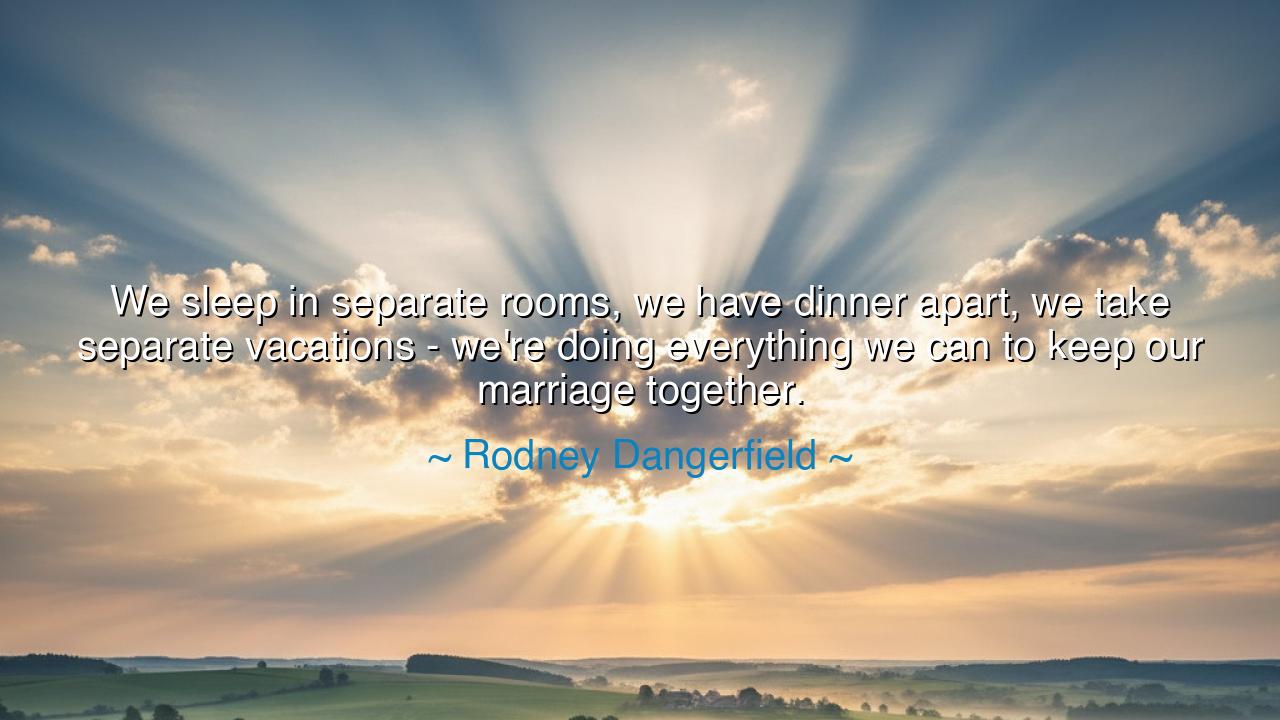
We sleep in separate rooms, we have dinner apart, we take
We sleep in separate rooms, we have dinner apart, we take separate vacations - we're doing everything we can to keep our marriage together.






The words of Rodney Dangerfield, “We sleep in separate rooms, we have dinner apart, we take separate vacations — we’re doing everything we can to keep our marriage together,” are cloaked in humor, yet beneath the laughter lies a profound reflection on the nature of human relationships. His wit, like that of the ancient jesters and philosophers, masks a truth that all wise hearts eventually learn — that love, though filled with joy, is also a constant act of preservation. Through irony, Dangerfield reveals the fragile tension between closeness and distance, between intimacy and individuality. He speaks as one who understands that even the most sacred bond, if suffocated, can decay — and sometimes, paradoxically, space becomes the only medicine that keeps the flame alive.
To understand this quote, one must know Rodney Dangerfield, a man whose comedy thrived on the trials of ordinary life. He was a philosopher in jest, turning pain into laughter and struggle into story. In this quote, he captures the timeless paradox of marriage — that it binds two souls together, yet demands room for each to breathe. His humor exaggerates reality to make truth visible: that sometimes love does not thrive in constant closeness, but in a rhythm of union and solitude, of companionship and retreat. To the casual listener, his words are absurd; to the reflective mind, they are a mirror.
The ancients, too, knew this truth. Plutarch, writing of the harmony between husband and wife, compared a good marriage to the harmony of a lyre: the strings must be close enough to create music, but not so tight that they snap. In every union, there must be both nearness and distance — the warmth of shared life and the coolness of personal freedom. Dangerfield’s jest, though born in the modern world, carries the same wisdom. By saying that he and his wife live apart “to keep their marriage together,” he points to a universal lesson: that love endures not by possession, but by respect for the soul’s need for space.
Consider, too, the tale of Marcus Aurelius and his wife Faustina, as told by Roman historians. Their marriage, though bound by duty, was often strained by the burdens of empire and ambition. Yet Marcus, the philosopher-emperor, wrote not of anger or resentment, but of gratitude — that love, even imperfect, was a teacher of patience and humility. His wisdom reflected the same truth Dangerfield found through laughter: that the work of staying together is not easy, and that sometimes love is preserved not by constant presence, but by the grace of distance.
In a deeper sense, Dangerfield’s humor also speaks to the imperfection of human love. We live in an age that idolizes passion, expecting perpetual harmony, yet the ancients would have called such belief naïve. Love is not a river that flows without obstacle; it is a garden that must be pruned, watered, and occasionally left to rest. The comedian’s exaggeration — separate rooms, separate dinners, separate vacations — reveals a hidden truth about resilience: that lasting love is not about avoiding struggle, but learning how to laugh through it. Humor becomes the bridge that carries two souls across the storms of imperfection.
There is a deeper power in his words still — the acknowledgment of humility. Dangerfield’s joke disarms pride, for it admits that even in love, we do not always know what we’re doing. He mocks himself to reveal the vulnerability all couples share. This humility, the ancients taught, is the foundation of enduring union. Aristotle wrote that friendship — the truest form of love — can only exist between equals who know their own faults. So too in marriage: laughter is the voice of humility, reminding us that no one escapes the absurdities of human coexistence.
Let this, then, be the lesson: do not despise the moments of distance, or the struggles that make you laugh instead of cry. For in laughter lies forgiveness, and in forgiveness, renewal. The wise do not seek perfection in love, but persistence. The secret, as Dangerfield’s humor teaches, is to keep finding new ways — even absurd ones — to stay together. Whether through laughter, patience, or distance, what matters most is the will to continue.
Thus, the words of Rodney Dangerfield become not merely a joke, but a philosophy: that marriage, like all human endeavors, survives through paradox. We must sometimes part to remain united; we must sometimes laugh to endure the pain; and we must sometimes embrace absurdity to rediscover truth. For the ancients were right — love, when too rigid, breaks. But when tempered with humor, humility, and the grace of distance, it endures like iron shaped by the fire of time.






AAdministratorAdministrator
Welcome, honored guests. Please leave a comment, we will respond soon